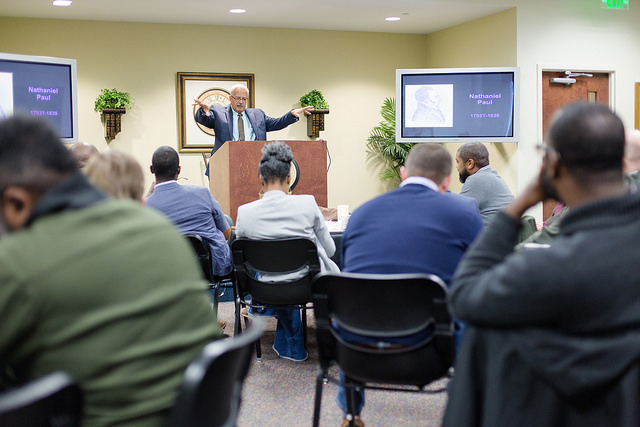
WAKE FOREST, N.C. (BP)–Only two days after the World Trade Center crumbled and the Pentagon burned, Paige Patterson opened the Scriptures and detailed for Southeastern Baptist Theological Seminary students seven principles for a godly response. With many from the Wake Forest, N.C., community in attendance at the chapel service, Patterson charged the congregation that the Christian man “must have the heart of a pacifist guided by a just mind informing a strong arm.”
Patterson, the seminary’s president, described the heart of a pacifist as “loving and seeking peace always in every way he possibly can, guided by a just mind so that he knows when that rare occasion comes when there is no other choice except to act with force.”
“And then that just mind guides the use of a strong arm, which in its strength may attack, but also which sometimes, and usually in its greater strength, may exhibit that strength by withholding its attack.”
Patterson said such a heart and mind is founded on the following principles:
1. Human iniquity is such that sometimes a violent response, even a lethal response is absolutely necessary.
2. Whenever violence is necessary, Christians must valiantly attempt to exact no more suffering or death than is absolutely essential to accomplish and maintain the peace.
3. Motives of revenge, brooding anger and fury are unworthy of Christian men.
4. Christians must seek to protect those who are uninvolved.
5. Except in the rarest of cases, a social order or a constituted national entity should be the vehicle of retributive justice.
6. When the enemy fails and falls, godly men must not rejoice in that calamity.
7. The aftermath of the confrontation yields one of three things: bitterness, hatred or forgiveness.
Patterson began by noting the intent of his message (the full text of which is on the seminary’s www.sebts.edu website) was not “to formulate a theory of just war, although, you will doubtless hear some of that in it.”
Patterson said his effort was to attempt to point to the Scriptures and give some guidance in thinking.
“And now I will tell you an additional reason why I am bringing a message of this kind this morning. The message is addressed primarily to [myself],” Patterson said. “And secondarily to you, because I want to go on record publicly as saying the things I’m going to say in order to hold myself accountable before God to be sure these attitudes are in fact my own.” Patterson began his message in Romans 13 and turned to several other passages to lay the foundation for these principles.
Romans 13 contained the first principle, that human iniquity is such that sometimes a violent response, even a lethal response is absolutely necessary.
“I want you to notice two things in the text,” Patterson said. “First, rulers are not a terror to good works but to evil, and the magistrate does not bare the sword in vain. One cannot read this passage of Scripture and come to the conclusion that some well-meaning souls have, that pacifism is an acceptable way. There is a time and appropriate way for the use of sword. But in the final analysis for the individual believer, it is the way of love that prevails.”
Patterson noted three cases in which the sword might be necessary. “First, there is defense. There comes a time when concern for the innocent and protection of those that cannot protect themselves demand that we be able to do this. A second area is deterrence. If one knows that he is going to pay a fearfully high price, maybe even his life if he does something, he is hesitant to do it. Then finally, there is the area of justice. Sometimes, there must be a lethal response in order for justice to be done.”
Patterson warned his students and staff not to be deluded by those who contend that there is no need to be armed in this country.
“And when good people do not have arms, you know who will [be armed] every single time,” he stated, referring to those who would commit evil.
The second principle, that whenever violence is necessary, Christians must valiantly attempt to exact no more suffering or death than is absolutely essential to accomplish and maintain the peace, also is rooted in Romans 13.
“I cannot tell you how important that is. The natural tendency of man is to take more than is necessary in order to get revenge,” Patterson said. He continued by saying that love conquers the sword ultimately, and “so it is to love that we must hasten, and that as an understanding of all that is embodied in the commandments.”
Patterson turned to 1 Peter 2:13 for the third principle: motives of revenge, brooding anger and fury are unworthy of Christian men: “Therefore, submit yourselves to every ordinance of man for the Lord’s sake, whether to the king as supreme or to governors, (now watch this) as those who are sent by him for the punishment of evildoers. (Now, that’s the second time we’ve read that) and for the praise of those who do good. For this is the will of God, that by doing good you may put to silence the ignorance of foolish men — as free, yet not using liberty as a cloak for vice but as bondservants of God. Honor all people, love the brotherhood, fear God, honor the king.”
“Notice that governors and those in authority are those who are sent by God to punish evildoers and to praise those who do good,” Patterson said.
“I do not know how you can be a man and watch the film of the plane crashing into the tower and not feel anger. That’s the reason I spoke of ‘brooding’ anger,” Patterson said. “Anger is almost a natural response at the moment, but brooding anger allowed to fester and continue in the heart will invariable produce a fruit of bitterness and an acrimonious spirit and ultimately assault from human perspective.”
From James 1:19-20, Patterson stated, “Listen to two thought-provoking verses: ‘So then my beloved brethren, let every man be swift to hear, slow to speak and slow to wrath; for the wrath of God does not produce the righteousness of God.'”
“There is nothing in that verse that comes naturally,” Patterson said. “The wrath of man worketh not the righteousness of God, and so many times I have to cite it to myself again. ‘The wrath of man worketh not the righteousness of God.'”
Next, Patterson turned to Leviticus 20:1-2 for the fourth and fifth principles: Christians must seek to protect those who are uninvolved, and that except in the rarest of cases, a social order or a constituted national entity should be the vehicle of retributive justice.
“First, in the case of capital crime, a parent taking a little baby and placing it in the white, hot arms of Molech, the stone goddess … when they incinerate that child as a sacrifice to Moses, they have impinged upon the God of life. And, because they have broken the most sacred of all laws regarding life, they shall be put to death. It is a capital crime,” Patterson said. “But notice that [justice] is not exacted at the point of a sword by an individual, but the whole congregation of the Lord is to take the responsibility so that it is laid on no one, but it is the social order itself that acts in exacting justice and retribution in this case.”
Patterson then turned to Romans 12:18, which states, “as much as is possible, as much as depends on you, live peaceably with all men.”
“We are instructed to seek peace at every hand, on every hand, at every opportunity, and we are to be sure that if peace is taken away, it is not because of an action for which we are responsible but rather as much as possible and as much as it depends on us,” Patterson explained. “Ladies and gentlemen, I suggest to you that Paul recognizes there do occur those circumstances in life when we cannot live in peace for whatever reason; where there must be a response of force,” he continued.
“Ladies and gentlemen, just because a person happens to be of Arabic ethnicity does not make them a culprit in the deed that has been done. We must be very careful that we not respond in a broad uncontrolled manner, lumping together the guilty and the innocent,” he said.
“I do not doubt that there are times when we have to act alone or in a small group, but the desire should be that where retributive justice has to take place — you saw all Israel stone them, all Israel shall bear part of the responsibility, so it’s no individual’s responsibility as such,” Patterson said.
Principle number six: When the enemy fails and falls, Godly men must not rejoice in that calamity. In Matthew 6:12, Patterson pointed out that in this “model prayer,” Christians are ask for forgiveness as they also should forgive their debtors.
Then, Patterson continued with Matthew 5:43-48, from the Sermon on the Mount, which states, “You have heard that it was said, you shall love your neighbor and hate your enemy. You are to love your enemies, bless those that curse you, do good to those who hate you, pray for those who spitefully use you and persecute you. And in this way you will demonstrate you are the sons of your Father in heaven … for if you love those who love you, where is the reward in that? Do not even the tax collectors do the same? Therefore, you shall be perfect as your father in heaven is perfect.”
“All of us were made sick by the signs of the Palestinians rejoicing over the deaths of those [who] passed away in the tragic strike,” Patterson said. “I want to tell you that we need to be very careful as we watch that, that it primarily invokes within us the determination never to be guilty of the same.
“Dear precious Christian friend, there is a fine line between rejoicing because good has prevailed and rejoicing at the fall of the enemy. We are permitted and even encouraged to rejoice over good that triumphs, but, do not make the next fatal step which would be to rejoice in the fall of the enemy,” Patterson warned.
He pointed to Proverbs 24:17, 18, which states, “Do not rejoice when your enemy falls and do not let your heart be glad when the he stumbles, lest the Lord see it and it displeases him and he turn away his wrath from him and implied have it come to you.”
Principle number seven: The aftermath of the confrontation yields one of three things: bitterness, hatred or forgiveness. Patterson read Matthew 18:21-22. “Then Peter came to [Jesus] and said, ‘Lord, how often shall my brother sin against me, and I forgive him? Up to seven times?’ Jesus said to him, ‘I do not say to you, up to seven times, but up to seventy times seven.'”
“The principle here is as plain as it can be,” Patterson said. “There is nothing ever done to you, nothing ever done to me that anywhere even approximates the staggering cost of our rebellion against God individually. You just need to understand that you will never have to forgive each other anything like what God for Christ’s sake has forgiven you.
“For the godly man, it must ultimately result in forgiveness because forgiven men have no choice in this matter,” Patterson said.
–30–


















